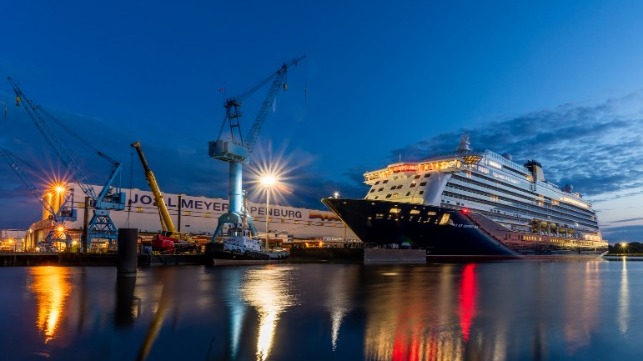VSM: Asian Shipbuilding Subsidies Put German Shipyards at Risk
"As a German medium-sized company, you cannot counter strategic action by the Chinese state," warns VSM

German shipbuilding association VSM is warning of the risk of an "irreversible loss" of skill in the country's powerhouse marine equipment and shipyard sectors due to distortions in international competition. Without government intervention at the national and EU level, warned VSM, Germany's yards run the risk of significant decline over the next decade.
Like others, German shipbuilders have been losing ground to Asian competitors for general-purpose merchant vessels for many years, and the sector has been sustained by specialization in cruise, yacht and defense contracts - so-called "complex shipbuilding" for highly-engineered vessels and high-end systems.
In recent years, Asian yards have begun to peel off European ro/ro and ferry orders as well, leaning on subsidies and "massive distortions of competition" to secure business. The same "protectionist tendencies" are also being seen in the equipment supply sector, VSM warned. This has significant implications for the German maritime economy as a whole, which accounts for about 200,000 direct jobs.
“As a German medium-sized company, you cannot counter strategic action by the Chinese state. That is why we need an active policy. With the previous [German government] framework conditions, there is a risk of irreversible loss of essential shipbuilding skills,” said Harald Fassmer, president of VSM and managing director of shipbuilder and supplier Fassmer.
The COVID-19 pandemic and the cruise industry shutdown have brought these vulnerabilities into focus, VSM said, because the disappearance of cruise ordering activity has made the absence of orders in other segments more evident.
"European shipbuilding has been losing market share for decades, because predatory competition is practiced with massive subsidies, especially in Asia, and Europe is not doing anything about it," said Bernard Meyer, managing director of Meyer Werft. "That is why the question is now whether the civil shipbuilding industry in Germany and Europe will be able to survive to a significant extent in ten years' time."
To address the threat, VSM called for "a consistent response at the national and European level" and a fundamental rethink of the framework conditions for European shipbuilding, with the objective of restoring a level playing field.
“The European Union has the largest single maritime market in the world. The geography of our continent provides for an abundance of economic activities on and under the water. That is why we in Europe have the power to optimally use our entire range of maritime capabilities for growth and sustainability," said VSM managing director Reinhard Lüken.
The warning comes several days in advance of a parliamentary hearing on the maritime economy, accompanied by the release of a German government report on the status of the sector. The report echoes VSM's concerns, warning of a growing risk of Chinese state-backed competition. "Aggressive competitors from Asia threaten not only Germany as a maritime location, but Europe as a whole. In particular, the Chinese strategy of top subsidies threatens the cruise ship building market segment - as in the past with freight, container or tankers," notes the report. "With the 'Made-In-China 2025' strategy, China is also aiming for the top position in global competition in high-tech shipbuilding."
